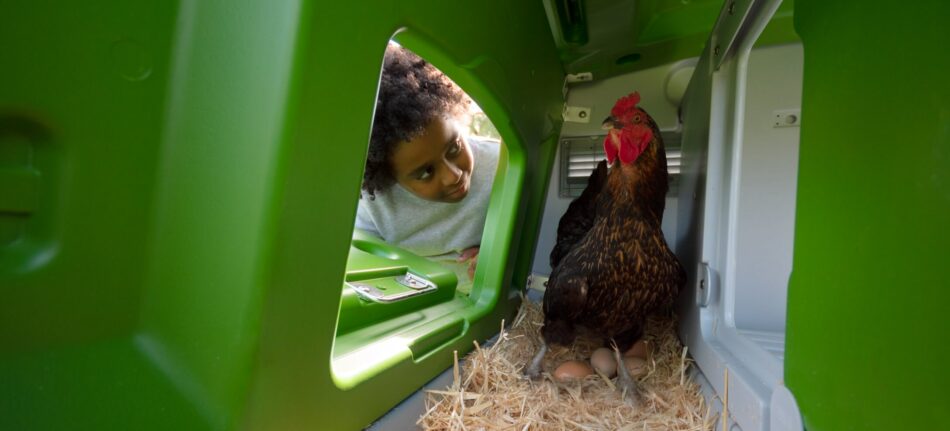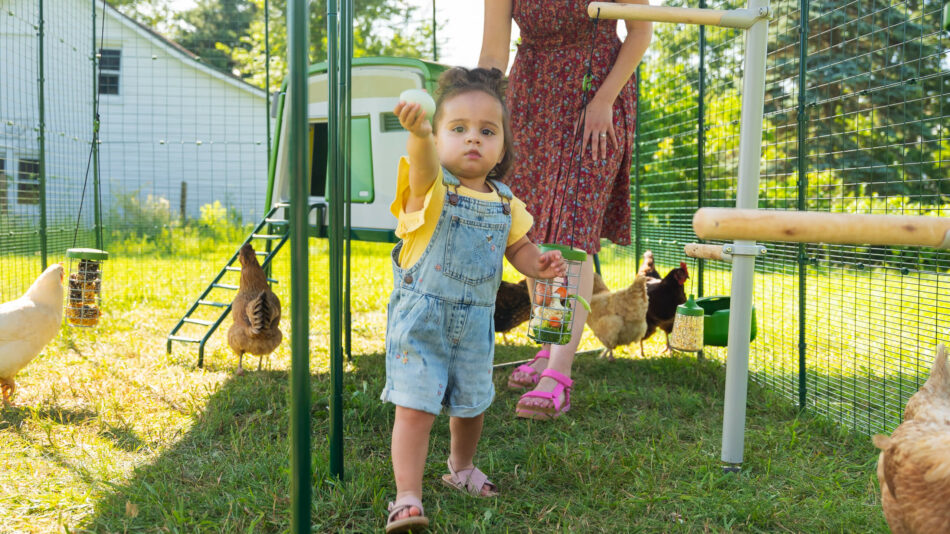How to supply eggs for your family
Eggs are a superfood – they’re delicious, nutritious, and highly versatile. And, up until recently, they were one of the most cost effective health-food items you could buy. But, as you’ll notice during your grocery shopping trip, eggs have skyrocketed in price. This may have you wondering how to supply eggs for your family without breaking the bank. Instead of modifying your weekly menu or researching egg-less recipes, consider keeping your own small flock of backyard chickens. The average family can feasibly have enough eggs with just a few hens. Here’s how you can start supplying your own eggs, and ignore the empty shelves or high prices at the store.
Why are eggs so expensive?
The main culprit behind the rising cost of eggs is avian influenza. This disease has been in circulation since the early 1900s, but goes through periods of dormancy before spiking again. The current spike began in 2021 and has taken a toll on the poultry population all over the world – particularly chickens.
The vast majority of chicken flocks that were lost during the worst of the avian influenza outbreak year were laying hens. This loss reverberated throughout the country, and ultimately, the entire globe. The result, along with rising inflation and cost of feed and fuel, has driven the cost of eggs up exponentially.
Do you remember buying eggs before this spike? For reference, the average cost of a dozen eggs in December 2021 was $1.79. In December of 2022, after the avian influenza spike, the average cost of a dozen eggs in the US was $4.25 – a 238% increase. We’re still seeing similar egg prices now in 2025, with a projected additional 20% increase in the price of eggs over the next 9 months, due to another spike in avian influenza in the winter of 2024. These figures are based on large, grade A (middle ground in the USDA “AA-B” ratings for freshness) eggs. If your family consumes cage free, free-range, or organic eggs, some states are seeing prices closer to $8 per dozen.
Is there a difference between store-bought and backyard eggs?
You probably remember the expression, “you are what you eat.” While this idiom is usually said to children in hopes of getting them to eat their veggies, it’s true for chickens too. There are noticeable differences between “regular” eggs and free-range or organic eggs. But what do these differences mean for your family?
Eggs say a lot about a chicken’s health. Healthy, happy hens lay gorgeous eggs, in a rainbow of colors unique to each hen. And, the healthier the hen, the healthier the egg is for you too. Nutrients a chicken takes in through their diet are passed through to their eggs. The darker the egg yolk, the more nutrient-dense it is. If you were to crack two different eggs: one from a regular dozen eggs, and one from a local free-range flock, you would notice the differences right away. Free-range hens lay eggs with a rich orange yolk, and a more opaque egg white. Commercially sourced eggs come from hens fed a diet of pellets containing fillers to bring costs down. The result is an egg that pales (literally) in comparison to those from hens that have access to fresh foods.
Organic eggs are laid by hens that are fed a specific diet. Feed for these chickens must be USDA certified organic, which has strict requirements. Additionally, these hens must be allowed to follow their natural biological rhythm (molting, laying frequencies, etc.) without the aid of hormones or other agents, and be kept cage-free. Because of their diet, the yolks and whites of these eggs will also be richer in appearance.
When you keep a flock of your own, you get to decide how to feed them. Flock-keepers get to determine the overall health and performance of their hens, and can feed them in a way that best suits their lifestyle. Whether you choose to feed organic pellets or let your hens free-range, you should also incorporate chicken-safe fresh fruits and vegetables, seeds, and chicken treats to boost egg production and quality.
How many chickens do I need to have eggs for my family?
“Good” layers are breeds of chickens that are known for their egg-laying skills. Chickens bred for egg production lay between 200-300 eggs per year. There are over 50 breeds of laying hens, but the chicken breeds most known for egg production are:
Chickens will lay fewer eggs in the late fall and into the winter due to their annual “molt” (the shedding of old feathers to replenish with thicker, fuller plumage for the colder months), and will also lay fewer eggs as they age. Laying hens will begin producing eggs around 16 weeks of age, and will continue for the next 3-6 years. The first 2 years of a hen’s egg laying career will have the biggest yield, and will decrease each year after.
You can determine a good size flock for your family by considering how many eggs you typically consume, as well as how often you need eggs for recipes such as baking. As a general rule of thumb, you can expect a good laying hen to lay an egg every day and a half. So, to have fresh eggs for breakfast every morning, a family of 4 would need a minimum of 4-6 hens. A flock of that size can easily be kept in a backyard chicken coop – just be sure to check your local chicken laws and guidelines to get permission to keep chickens if necessary.
Are chickens hard to take care of?
There are many myths about keeping chickens, most of which are just that – myths. Chickens are actually very easy to take care of, once all of their needs are met. The requirements for keeping hens healthy and happy are:
- A secure chicken coop and run
- Fresh water
- Quality pellet diet
- Enrichment such as a freestanding chicken perch or chicken toys
Hens can have food and water available at all times, as they will not overeat. This makes them ideal pets for families that travel frequently or are unsure if they can commit to a feeding schedule. As long as their coop and run are predator-resistant and sturdy, chickens will do well when left to their own devices!
An easy to clean chicken coop is the best way to virtually eliminate odors from your chickens. Hens themselves aren’t odorous, but their droppings can be. Odor-absorbing bedding such as pine pellets or shavings can be found at any local feed or pet store. Chicken-safe disinfectants will keep their coop smelling fresh in between cleaning, and can be found in stores or made through DIY recipes.
Chickens don’t require vaccinations or registration (unless otherwise stated by your governing authorities), don’t need to be spayed or neutered, and as long as their conditions are kept clean, have very few health concerns. Still, be sure to contact a veterinarian that treats chickens in case of illness or injury and keep their information available should your flock need medical care.
What else can I do with my chickens?
There are many benefits to owning chickens. Aside from delicious eggs, chickens make entertaining and engaging pets, and are full of personality. Many hens enjoy interacting with their caretakers, love treats, and can even be taught to perform tricks.
If your backyard allows, your chickens can be let out of their run to peck and graze in the grass. There are few things more relaxing than watching your flock peck the ground. And, hilarity often ensues when a hen goes running off in pursuit of a flying bug to catch. Chickens make excellent pest exterminators, eating pests such as ants, slugs, spiders, and even scorpions.
Children are particularly enamored with chickens. Hens make great pets for young owners because of their low maintenance care. Chicken coops that have easy access nest box doors make egg gathering a perfect chore for kids. Hens that are known to be easy going and good natured include:
- Buff Orpingtons
- Silkies
- Cochins
- Polish
Individual chickens have their own personalities, so it’s important to have your children meet their chickens before bringing them home. Plus, picking out chickens is always exciting – no matter how old you are.
Backyard chicken setups can be customized to be a conversation piece in your backyard. Walk-in-chicken runs are enjoyable for both adults and children, and can have elements such as a chicken PoleTree added to add both attractive and functional levels to your flock’s space. Plus, with accessories like a chicken swing, your backyard will quickly become the talk of the neighborhood.
Omlet has what your family needs
All of our chicken-keeping products – like our range of Eglu Chicken Coops and Walk In Chicken Runs – are an all-in-one solution to keep chickens efficiently and effectively. There’s no guesswork when it comes to sizing – our experts have done the “chicken math” to optimize both your space and space for your hens. Keeping chickens can not only give your family a steady supply of nutritious eggs, but also offer an experience unique to hens as pets. We believe that chickens don’t just belong on a farm, but can be enjoyed by humans and thrive in an urban environment. Are you ready to add the pet that provides breakfast to your family?
This entry was posted in Chickens


